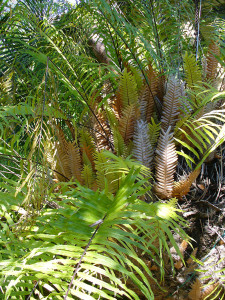Drynaria, commonly known as basket ferns, is a genus of ferns in the family Polypodiaceae. It contains around 16 species and one natural hybrid.
Contents
Uses
Numerous ethnopharmacological studies have been conducted into the properties of Drynaria In agreement with their use in traditional medicine, several studies have shown that basket ferns (D. roosii in particular) are effective in preventing resorption of bone cells andosteoporosis, increases bone density, and have therapeutic effects on bone healing.They have also been shown to possess a wide range of antimicrobial activity. Rhizoma drynariae has immune-promoting, anti-inflammatory, and neuroprotective effects
Benefits
Modern pharmacological actions of Drynaria
1. Its water decoction and Drynaria extract by alcohol can prevent the rising of serum cholesterol and triglycerides. In addition, they can prevent the formation of atherosclerotic plaques;
2. Its polysaccharides and flavanone glycosides can lower blood lipid and resist arteriosclerosis;
3. It can promote bone’s absorption of calcium, increase calcium and phosphorus levels, which is conducive to fracture healing;
4. It can improve cartilage cells and postpone degenerative lesions of bone cells;
5. The flavanone glycosides contained have significant sedative and analgesic effects.
Caution
It was reported that overdose of Drynaria herb might result in adverse reactions such as poisoning and stomachache. But so far no recognized drug interactions found clinically. TCM wise Gu Sui Bu herb should be used with cautions in cases of fire excess from yin deficiency and blood deficiency and wind-dry.
Interactions
None are recorded.
Other names
basket ferns
Reference
Source: Wikipedia, https://en.wikipedia.org/wiki/Drynaria
Chineseherbshealing, http://www.chineseherbshealing.com/drynaria-gu-sui-bu/

